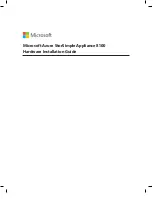
190
TERMINAL SERVERS
SESSION TELNET AO REQUEST (secure)
{
character
(DEFAULT:CTRL/O)}
SET SESSION Telnet AO [REQUEST]
{<DEL>
}
{NONE
}
The abort output (AO) request specifies a keyboard character which calls
up the Telnet Abort Output function. This function aborts output en route
to the user’s terminal. The default character is Ctrl/O. If <DEL> is to be
designated as the keyboard character, enter “<DEL>” (including the angle
brackets.
SESSION TELNET AYT REQUEST (secure)
{
character
(DEFAULT:CTRL/O)}
SET SESSION Telnet AO [REQUEST]
{<DEL>
}
{NONE
}
Are-You-There (AYT) request designates a keyboard character to call up the
Telnet AYT function. The remote host then returns a message that it is still up
and running. The default character is Ctrl/T. If <DEL> is to be designated as
the keyboard character, enter “<DEL>” (including the angle brackets).
SESSION TELNET BINARY (secure)
{DISABLED }
SET SESSION TELNET BINARY {DUPLEX
}
{RECEIVE
}
{TRANSMIT}
On this Telnet connection, binary data is transmitted and received by use
of binary transmission. Each direction can be enabled or disabled separately.
DISABLED in both directions is the default.
Summary of Contents for LE2101A-BT-R2
Page 2: ......
















































